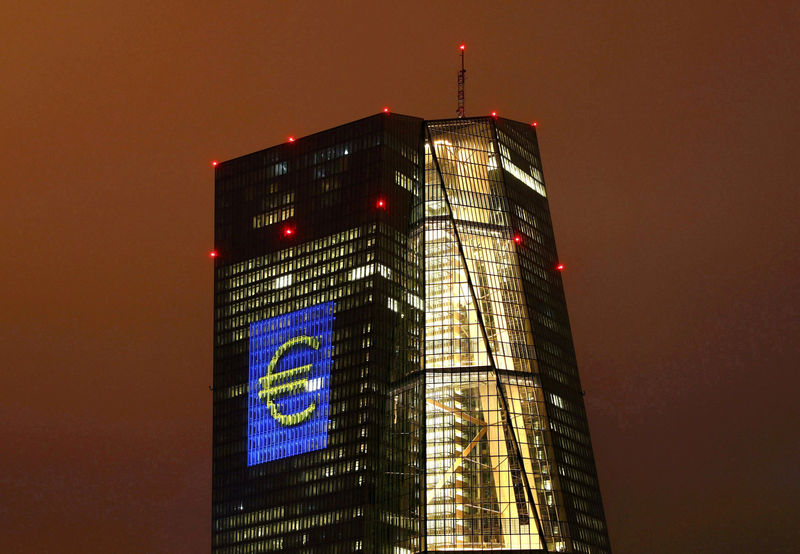By Balazs Koranyi and Frank Siebelt
FRANKFURT (Reuters) - The European Central Bank is ready to temporarily step up purchases of Italian government bonds if the result of a crucial referendum on Sunday sharply drives up borrowing costs for the euro zone's largest debtor, central bank sources told Reuters.
Italian government debt and bank shares have sold off ahead of the Dec. 4 referendum on constitutional reforms because of the risk of political turmoil. Opinion polls suggest the 'No' camp is heading for victory, which could force out Prime Minister Matteo Renzi in the latest upheaval against the ruling establishment sweeping the developed world.
The ECB could use its 80-billion-euro ($84.8 billion) monthly bond-buying programme to counter any immediate, further spike in bond yields after the vote, smoothing market moves and supporting bonds, according to four euro zone central bank sources who asked not to be named.
The sources added the scheme was flexible enough to allow for a temporary increase in Italian purchases and that such a move would not necessarily need to be rubber-stamped by the ECB's Governing Council, which is due to meet on Dec. 8 to decide on whether to keep buying bonds after March.
But they stressed this would be limited to days or weeks, to counter any immediate market volatility, because the asset-purchase programme was designed to shore up inflation and economic growth in the entire euro zone and was not intended to fight crises in individual countries.
This means that, if Italy or its banks needed longer-term financial support, Rome would need to formally ask for help.
"The Governing Council understands that there is some space to help Italy, which will be used, if needed. The asset purchase programme has built-in flexibility," said one of the sources. "The key is that the ECB has to be convinced the volatility can be overcome by using this flexibility."
The ECB declined to comment.
With one of the world's largest public debt piles, Italy's borrowing costs are closely watched as a potential flashpoint for market instability in the wider euro zone.
They risked spiralling out of control during the sovereign debt crisis until ECB President Mario Draghi pledged in 2012 to do whatever it took to save the euro.
RENZI RISKS
Renzi has said he will resign if Italians reject his constitutional reforms, which would drastically reduce the powers of the upper house of parliament and take back some decision-making powers from the regions.
Investors worry that his departure would lead to political instability and bolster the anti-establishment 5-Star Movement, which has called for a referendum on euro zone membership.
Speaking in public, ECB officials remain sanguine.
Draghi emphasised on Monday that Italy's debt was sustainable, albeit with no room for complacency given its huge sovereign debt pile.
Vice President Vitor Constancio opened the door to an ECB intervention last week but also stressed that still-low Italian bond yields did not point to investor fears that the country may crash out of the euro zone.
Indeed, the health of Italian banks, rather than the governments' own borrowing costs, may be Rome's biggest worry in the aftermath of a 'No' vote.
Italy's 10-year bond yields stand at 2 percent, the highest level in more than a year but nowhere near the 7 percent level that prompted emergency ECB purchases in 2010-11 and eventually led to the resignation of Prime Minister Silvio Berlusconi.
Italian banks' share prices indicate investors are concerned about their ability to raise the cash they need to work off their huge piles of unpaid loans, a legacy of the financial crisis that is hampering confidence in the sector and curbing economic growth.
BANK CAPITAL
Shares in Italian bank Monte dei Paschi di Siena are near all-time lows over concerns it may fail to raise the 5 billion euros it needs as part of a rescue plan agreed with the ECB, which is also the euro zone's banking supervisor.
The stock of larger peer UniCredit, which is also planning a cash call, is also close to a record low.
Euro zone central bank sources say there is little the ECB can do about the banks' need for capital unless Italy itself asks for a rescue programme for its banking sector.
This would also unlock further, country-specific ECB purchases of Italian debt, known as Outright Monetary Transactions (OMT). These, unlike the current asset-purchase programme, are not tied to the "capital key", or how much capital each country has paid into the central bank.
"There is a risk that a bout of volatility would have a broader impact on the bank sector," one of the sources said. "At that point, it's not for the ECB to act. That's typically where OMT needs to come in with all the requirements, including a (rescue) programme."
Asking for such a programme has been an unpalatable option for Rome as it would require private investors in banks to lose their money in a so-called bail-in before European public funding can be used.

($1 = 0.9435 euros)
(Additonal reporting by Francesco Canepa and Noah Barkin; Editing by Pravin Char)